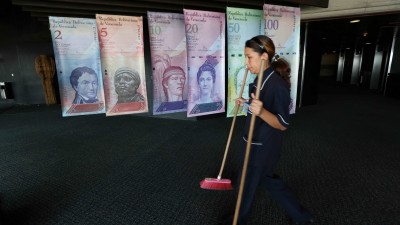Venezuela Cash Reserves Reach New Low Amid U.S.- Led Sabotage

From 1958 up until Chávez’s presidency began in 1998, Venezuelan politics rigidly conformed to U.S. political and economic interests on all strategic issues. For nearly 40 years, Venezuela was at the U.S.’ beck and call – following Washington’s lead in breaking off relations with Cuba, supporting U.S. invasions of other Latin American nations and backing U.S. counter-insurgency policies throughout the region.
In the late 1980s and early 1990s, the Venezuelan government moved to make the nation’s economy subservient to U.S. interests by committing to programs promoted by the International Monetary Fund (IMF) that privatized the majority of the nation’s resources and introduced drastic austerity programs.
While U.S. corporations reaped massive profits,Venezuela’s inflation hit triple digits, its unemployment rate spiked and poverty rates hovered around 50 percent. As a result, these policies fostered caustic resentment against U.S. domination of Venezuela’s political and economic structures, resulting in the rise of Hugo Chávez.
Chávez, upon becoming president, worked to unchain Venezuela from U.S. influence, passing numerous reforms and nationalizing key utilities that had been privatized decades earlier. These efforts, which translated into dwindling U.S. influence, earned him the ire of the Bush administration, whose efforts to oust Chávez culminated in the failed coup attempt of 2002.
Emboldened by the U.S.’ failed regime change efforts, Chávez then moved to nationalize Venezuelan oil and even more utilities, ejecting numerous U.S.-based multinational corporations in the process. Though the U.S. refrained from attempting to overthrow him, the Venezuelan government has accused them of being responsible for Chávez’s untimely death in 2013 – claiming that they induced the cancer that claimed his life as a covert means of assassination.
In the years since Chávez’s death, his successor Maduro has been fighting wave after wave of destabilization attempts. Most of these efforts have manifested economically, including widespread shortages of goods and basic necessities. However, on more than one occasion, Venezuelan authorities have caught businesses hoarding food, medicine and other goods in order to create the appearance of scarcity while raising profits through massive price increases and the smuggling of goods to Colombia.
The Venezuelan government has also accused these businesses of intentionally creating scarcity with the goal of fueling unrest that could destabilize the government. If history is any indication, this is quite likely, considering the same tactics were used against the Allende government in Chile in the 1970s.
However, the most destabilizing influence of all has been lower global oil prices. Venezuela’s economy is largely dependent on oil exports, which represent 90 percent of its total exports. Thus, the decline in oil prices has done a number on the nation’s economy – even forcing them to import oil due to the financial difficulties plaguing the country’s refineries.
This decrease in oil prices has not been based on the whims of the market, but rather a concerted effort led by the U.S. and its ally Saudi Arabia. The artificial lowering of oil prices has several benefits for the U.S.-Saudi alliance due to the economic harm it inflicts on the Saudi’s oil-producing competitors – chief among them Iran, Russia, and Venezuela. These are also countries that the U.S. aims to contain.
Maduro was well aware of the situation when he asked rhetorically: “What is the reason for the United States and some U.S. allies wanting to drive down the price of oil? To harm Russia.” But Venezuela has arguably been much harder hit than any other country targeted by the price drop.
Another tactic employed by the U.S. to force Maduro out of power has been the imposition of sanctions. In 2015, the Obama administration imposed sanctions on Venezuela, asserting that the South American nation was a direct threat to U.S. national security, despite no evidence offered to support this claim. At the time, many journalists and analysts noted that the timing was odd, as it coincided with the Obama administration’s attempts to normalize relations with Cuba.
“President Barack Obama … has personally decided to take on the task of defeating my government and intervening in Venezuela to control it,” Maduro said in a televised address soon after the sanctions were announced.
Despite Venezuela’s resilience against U.S.-led sabotage for nearly two decades, they may not be able to hold out for much longer. Venezuela’s cash reserves have dwindled to a mere 10.5 billion dollars, 7.2 billion of which they must use this year just to pay off outstanding debts. These latest figures, based off of data recently released by the nation’s central bank, show that the South American nation’s reserves have declined dramatically. For instance, in 2015, Venezuela had 20 billion dollars in reserves and, in 2011, it held over 30 billion dollars.
Venezuela is running out of time, as the country is set to run out of cash within a year or two. But the day of reckoning could come sooner if the U.S. and the Saudis choose to collude once again in slashing global oil prices, as this would further crippling Venezuela’s economy.
Some of Venezuela’s more powerful allies may try to keep the Maduro-led government afloat. But if Venezuela’s government were to run out of funds and subsequently collapse, it would only be the latest leftist government to fall in a nearly century-old U.S. government effort to eradicate socialism and democracy in Latin America.

